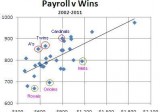Payroll = Wins
 ............
............
The above is from Tom Tango's fine site. Before proceeding further ... amigos might want to take a look at this chart and this chart.
Look at how MANY of those teams are right on the correlation line. The Yankees (far right) are almost purely a function of salaries paid. They have done slightly worse than they should have, for the dollars.
People want to look at the Twins and say, "money's not such a big deal." You might as well look at the A's and say, "offense isn't such a big deal. They do okay with better-than-average pitching." That shouldn't distract us from the fact that as a team scores more runs, it wins more games.
...........
As you note, G, people want to look at one poor team that defied gravity -- by piling up a decade's worth of 1-1 picks. Why not consider the Pirates, Royals, and everybody else trying to do the same thing and failing?
There have been 4-5 teams that have won six or eight games, per season, more than their payroll suggested. And another 4-5 teams that have lost six or eight more per season than their payroll suggested. But they also are tethered to the correlation line.
The Mariners, by the way, are the #4 worst team on that graph, after the Mets, Orioles, and Royals. They should have been around .500 the last decade, but have been, what, 50 or so games below that? (Check me on that.)
..........
High salaries produce wins -- and then those wins produce high income. Round and round we go, if you're the LA Angels.
.
=== New CBA = Belly Flop into the Jell-O Pool ===
Haven't seen mentioned, in Seattle, the fact that the new 5-year CBA has given the owners cost certainty.
Teams like the Angels and Rangers have been waiting only for this airhorn call, and now they are acting like they realize "You spend money to make money."
Teams' values do go up as they win, and go up as they acquire iconic players. You saw Hicks buy ARod for 3 years so that he could score his TV deal and then sell at a big capital gain.
Even the Mariners are talking Teixeira money for Prince Fielder. They've got cost certainty and they know that a contending team, with Fielder on the commercials, is going to jack up the value of the franchise. Big time.
Geoff Baker had another interesting article today; there was only one thing he said that I'd quibble with. He noted that the White Sox' franchise value had gone from $248M to $526M in seven years but "can't just sell shares to turn paper value into real money."
An MLB team certainly can turn paper value into real money: it's called a credit line from the bank. If the White Sox "borrowed" $100M -- simply writing checks or, more precisely, approving electronic transfers, then its liabilities go from $248* to $348M. Five years on, when they sell their franchise, that $348 is simply deducted from the $600M sale price. It's like a HELOC on your house - you never pay it back if you are in a strong equity position. (True, you service the debt with monthly payments.)
Again, rather than assuming that rich men like Arte Moreno don't know what they're doing, the saberdudes might want to consider whether an Albert Pujols or Prince Fielder is part of a broader business plan. Boeing does not create its 10-year business plans armed with nothing more than a $/Passenger spreadsheet.
I'm sorry that a $/WAR calculation is a bit too simplistic to "solve" baseball. It makes for a great clipboard by which to sit, as a professor would, and grade the owners as though they were our students ina college class.
But you'll notice that, as it pertains to the franchise players, the owners aren't handcuffed to the data that we 'net rats possess.
BABVA,
Jeff